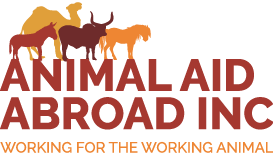Change is Happening! Fewer injuries mean brighter futures for Kedarnath’s mules
For three weeks, a dedicated team of animal carers, including a mobile equine team and four experienced field paravets, set up camp in Kedarnath to assist the mules and ponies that carry heavy loads along steep mountain paths. Your support helped make these clinics possible.
The animals are essential to their communities, yet they often suffer in silence from injuries and illnesses. The Friendicoes team provides treatment, compassion, and understanding, making life better for these animals.
Workshops for Equine Owners
Workshops were organised for mule owners, not just to teach but to connect.
The team listened to the challenges these owners faced and worked with them to find solutions.
Together, they explored how to prevent common problems like colic, backsores, lameness and indigestion. The conversations were honest, practical and aimed at creating real change, for both the animals and the people who depend on them.
Tackling Common Health Issues
1. Colic: When animals suffer from colic, they are in visible pain - lying down, getting up, restless, and unable to eat or relieve themselves. It’s hard to watch, but the team worked to ease their suffering. With pain relief, stomach tubing and other treatments, the sick animals found relief.
And there’s hope, this year, there were only 46 cases of colic, compared to over 300 last year.
This shows how much progress has been made in educating owners about proper feeding practices!
2. Backsores: Walking steep trails with loose saddles or poor padding often leaves mules with painful back sores that can turn into large wounds if ignored. The team cleaned and dressed these wounds, gave antibiotics, and ensured daily care.
3. Lameness: Sharp rocks, slippery mud, and heavy loads make hoof injuries almost unavoidable. For many animals, the sharp pain of a puncture or abscess makes every step unbearable. The team stepped in, treating each case with care - cleaning wounds, applying antiseptic, and teaching owners how to clean their mules’ hooves daily.
4. Indigestion and Worm Load: Some of the mules were so thin and weak they could barely stand. Their bodies were worn out from poor nutrition and worm infestations. The team gave them deworming medicine, supplements, and the chance to recover.
5. Wounds and Injuries: Floods and accidents left many animals with deep cuts and bruises. One mule had a gaping chest wound from a rope rubbing against its skin. Another slipped on the trek and injured its head on a rock. The team cleaned every wound with care, applied antiseptics, and provided pain relief.
6. Eye Injuries: One mule had been jabbed in the eye by an iron rod carried by another animal. Another’s head collar had rubbed its eye raw. These injuries were cleaned, treated with ointments, and monitored closely. The team’s steady care gave these mules relief from the pain and a clear path to recovery.
Innovative Solutions for Better Welfare
Hoof Picks
This year, the team distributed hoof picks to mule owners, a simple yet powerful tool. With proper care, many hoof problems can be avoided. The team showed owners how to clean their mules’ hooves after every trek, removing stones and debris before they caused damage.
Soft Muzzles
To stop mules from eating garbage and plastic while trekking, soft woven muzzles were provided. This small change had a huge impact, significantly reducing cases of colic and other digestive issues.
Blankets / Soft Keens
For those who missed out last year, blankets were handed out to protect the animals and for warmth. It was a small gesture, but one that brought much-needed comfort to working animals.
Rescue
The team heard about an abandoned pony left to fend for itself in Hailey Mandi, Gurgaon. They didn’t hesitate. The pony was brought to a shelter, where it was given the care and safety it desperately needed. Stories like this remind us why this work matters, it’s about stepping up for animals who have no one else.
Impact of the Camp
Every member of the team gave their all, from the field paravets, Jaheer and Nabab, who each helped 95 animals and 75 animals respectively.
Field Paravet- Jaheer and Nabab
Sakir, Om, and Salman, who ensured that every mule received the care it needed. Together, they treated 170 animals and left a lasting impact on both the animals and their owners.
Sakir, Om, Salman were with the team in Kedarnat
Through education, treatment and innovative measures, the camp made significant strides in improving equine welfare, leaving a lasting impact on the lives of animals.































